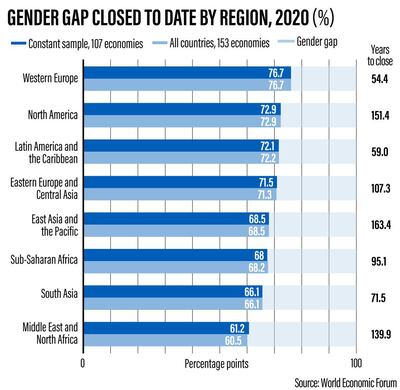Leading multinationals such as Accenture, Estee Lauder, Mastercard, Proctor & Gamble, Standard Chartered, Uber Technologies and Unilever are among companies that have been added to Bloomberg’s 2021 Gender Equality Index, according to a statement late on Wednesday.
A total of 380 companies across 44 countries have been added to the index this year, the statement said. For the first time, firms domiciled in Indonesia and Bermuda now report on gender-related data.
"As we continue to grapple with the pandemic, we’ve seen companies put increased emphasis on the ‘S’ in ESG," said Peter Grauer, chairman of Bloomberg. "The companies included in this year’s Gender Equality Index are committed to providing an inclusive work environment, supporting work-life balance and flexible work arrangements to retain a talented workforce and create a competitive advantage in this changing business environment."
The index makes gender-related practices and policies at publicly-listed companies more transparent, thereby increasing the environmental, social and governance (ESG) data available to investors.
The Covid-19 pandemic has had a disproportionate effect on women and threatens to set back their economic empowerment and widen the gender gaps that persist, the International Monetary Fund said in a blog post in July.
Women are particularly vulnerable to the health crisis because they are more likely than men to work in the sectors hardest hit by the pandemic. These social sectors – such as retail, tourism, hospitality and services – often require face-to-face interaction, the Washington-based lender said.
Although the data provided for the 2021 index is from fiscal year 2019, it demonstrates how companies were already considering more flexible working styles before the coronavirus pandemic struck. Some 87 per cent of companies included in the GEI provide flexible working hours and 85 per cent offer flexible working locations, a trend that has become more pronounced amidst Covid-19.
Also, GEI members’ boards comprise 29 per cent women on average, while 61 per cent have a chief diversity officer or an executive with the primary responsibility of diversity and inclusion. The companies included in the index have an average of 39 per cent women in revenue-producing roles and more than half (52 per cent) require a gender diverse slate of candidates for management positions, Bloomberg reported.
Companies on the index are also hiring more women than they are losing, with 69 per cent of them having a strategy to recruit women and 59 per cent conducting a global gender-based compensation review. About 85 per cent of employees who return after parental leave remain with their company, with 46 per cent of such firms providing childcare subsidies or other financial support.
Organisations included in this year’s index also reported inclusive corporate policies. Six in 10 companies sponsored financial education programmes for women, while 64 per cent sponsored programmes dedicated to educating women in STEM, according to Bloomberg.
"As businesses strive to maintain strong corporate cultures in today’s virtual world, business leaders have the opportunity to drive progress on gender equality for years to come," said Patricia Torres, global head of sustainable finance solutions at Bloomberg.
“This progress can begin with the GEI framework, which helps companies assess where they are on the path to gender parity relative to their peers, and hold themselves accountable to their goals," she said.
GEI data, she added, gives investors a comprehensive view into how practices are driving increased employee engagement and productivity, higher company market value, while creating positive change in local communities.
Although the index raised the threshold for inclusion in the 2021 edition, a record number of companies disclosed their data, with members having a 94 per cent disclosure score on average.
However, the average data excellence score was only 55 per cent. The data excellence score covers five pillars: female leadership and talent pipeline, equal pay and gender pay parity, inclusive culture, sexual harassment policies, and pro-women brand.



